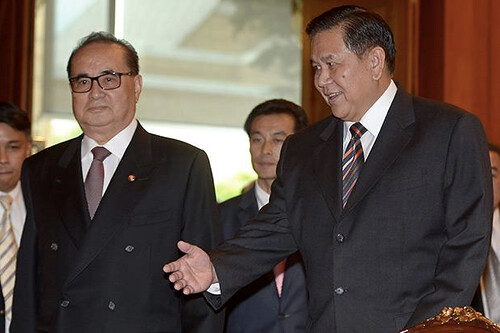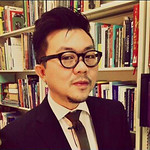On 10 August 2015, North Korean Foreign Minister Ri Su Yong paid an official visit to Bangkok to boost bilateral ties. Among many issues, ironically, the two countries pledged to promote human rights and to enhance economic cooperation. They also discussed the issue of “nuclear” which might have made some Western nations disturbingly uncomfortable.
However, one question emerges: How well do Thai people really know about the role of North Korea in Thailand, or indeed in this region. This essay highlights aspects of North Korea’s active diplomacy in two areas: Through missionaries and trade.

Thailand's Foreign Minister and Deputy Prime Minister Tanasak Patimapragorn (right) shows the way to North Korea's Foreign Minister Ri Su Yong ahead of their meeting at Government House on Aug 10, 2015
Korean Missionaries
The Korea Presbyterian Mission (KPM) and the Global Christian Fellowship were established in Thailand almost 30 years ago and received the funding from Christian community back in South Korea. The role of South Korean missionaries in Thailand may concentrate on providing shelters to young homeless children, the elderly and drug addicts. But their recent involvement in the North Korean refugees in Thailand has generated controversy regarding the real function of these Korean establishments.
In the past decade, North Korean refugees who have fled from hunger and repression in their homeland have taken long and dangerous land routes from China to Thailand, Myanmar, Laos and Vietnam and other countries in Southeast Asia to seek refuge.[1] Thailand has been chosen as the favourite destination for North Korean refugees as it has remained the only country in the region that accepts North Korean asylum.
“Thailand is probably the best country to go right now,” says Chun Ki-won, a Korean missionary once jailed in China in 2001 for his religious work, currently director of the Durihana Mission group.[2] The Durihana Mission group is known for offering assistance and shelter to North Korean defectors in Thailand. The Thai government has tried to discourage North Koreans from using Thailand to seek asylum, fearing it could disrupt diplomatic relations with both governments in Seoul and Pyongyang.
In 2004, it was possible for North Korean refugees to travel to Vietnam from China and fly to Seoul. The number of North Korean refugees reached almost 500 and eventually instigated conflict between the government in Seoul and Hanoi because, in the end, the Korean authority had no choice but to transport them belatedly to Seoul aboard a chartered plane. Viewing it as interference, North Korea suspended inter-Korean relations in retaliation. And the Vietnamese route was closed.[3]
Evidence shows that active Korean missionaries have been highly involved in the provision of spiritual and political shelter for North Korea defectors, which has brought discomfort among Southeast Asian governments in the dealing with North and South Korea. For example, in 2004, Park Jun-jae of the Durihana Missionary Centre, while trying to shepherd six North Korean defectors across the border from China to Myanmar, went missing somewhere along the steep and rugged terrain.[4]
Certain Southeast Asians have distressingly considered Korean missionaries as threats to their long-held religious beliefs either among Catholics or Buddhists, and to their political relations with North and South Korea regarding the North Korean refugee issue. The perception of threat is intensified by the fact that the seemingly dubious activities of the evangelical missionaries are going against the wave of Korean culture.
At the heart of the problem lies the reluctance and inability on the part of the South Korean government to limit the political role of the evangelical missionaries aboard that could be extremely harmful to the country’s foreign relations. The government has long known to enjoy harmonious relations with the conservative churches since they both recognise the danger of the political and military power inherent in North Korean communism.[5] Existing good relations that have lasted until now continue to cast a long shadow over the state’s unwillingness to interfere in the churches’ affairs even when they threatened national interests.
Food for Cash
In another regional reality, South Korea has to compete brutally with other so-called cultural powers in order to perpetuate its influence in Southeast Asia. And its main rival at this hour looks rather familiar—North Korea. Recently, North Korean businesses have made inroads into the heart of Southeast Asia. The Pyongyang Restaurant in Cambodia’s Siem Reap, established in 2003, was so successful that another branch was launched in the capital Phnom Penh a year later.
Owned and run by the North Korean government, the restaurant is famous not only for its cold noodles and barbecue served with kim chi, but also for its talented staff, which when not serving are dancing to traditional Korean tunes played on violins and electric pianos. Bertil Lintner reported that threatened with sanctions, the Pyongyang authorities were able to continue to run a string of small-scale companies and business across the region that kept foreign-currency earnings flowing back home.[6]
In 2006, the owner opened an even bigger restaurant in Bangkok, with all waitresses dressing in traditional costumes known as chima jogoiri, and with little Kim Il-sung badges on their blouses. Lintner also mentioned that the choice of Thailand is significant in a sense that the kingdom is currently North Korea’s third largest trading partner, after China and South Korea, and of course a favourite destination for the North Korean refugees.[7]
North Korea is not only attempting to establish its presence while making lucrative businesses in Southeast Asia, but also to reclaim its cultural hegemony from its rival in the south of the Peninsula. The visit to Bangkok of the North Korean top diplomat is a part of the attempt of Pyongyang to win over Thailand and perhaps turn the latter into a gateway to Southeast Asia.
 Pavin Chachavalpongpun is associate professor at Kyoto University’s Center for Southeast Asian Studies.
Pavin Chachavalpongpun is associate professor at Kyoto University’s Center for Southeast Asian Studies.
[1] Alisa Tang, “North Korean Defectors Detained in Thailand,” Associated Press, 24 October 2006.
[2] “North Korean Refugees Redux,” in Asia Times, 20 September 2007.
[3] Benjamin Yoon, “Thailand is Final Life Line for North Korean Refugees,” in The Chosun Ilbo, 30 April 2007. Yoon is secretary-general of the Citizens' Alliance for North Korean Human Rights.
[4] Wonhee Lee, “Laos is Now a Major Transit Point for North Korean Defectors,” at http://www.rfa.org/english/news/social/2005/11/22/nkorea_laos
[5] Wi Jo Kang, Christ and Caesar in Modern Korea: A History of Christianity and Politics, New York: State University of New York Press, 1997, p.97.
[6] Bertil Lintner, “Dining with the Dear Leader,” at http://www.atimes.com/atimes/Southeast_Asia/IC15Ae01.html, 15 May 2007
[7] Ibid.

